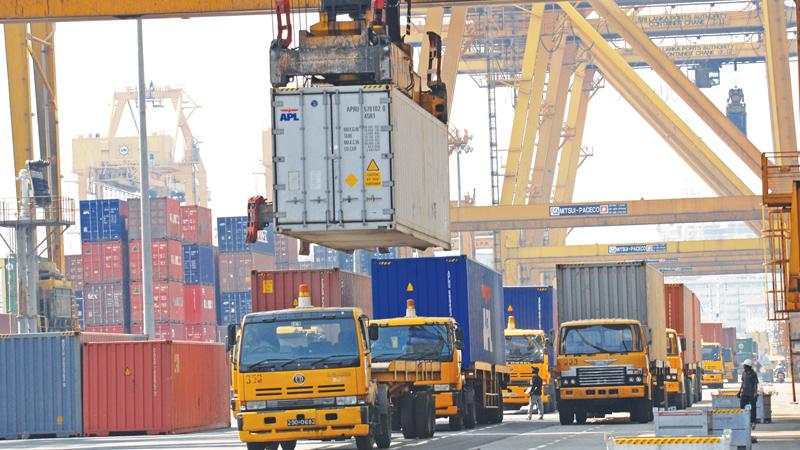
Strolling across the courtyard of Arcade at Independence Square in Colombo, having sipped Moroccan mint-flavoured tea at the Tea Boutique, Ali Ansari, who till recently was CEO and President of Pakistan’s largest listed conglomerate, EnGro, was in a relaxed mood.
“What tranquillity, what pace of life,” he said, breathing in the atmosphere, hot, somewhat humid, “but so much better than Dubai or Karachi.”
Ansari was on a flying visit to Colombo, having spent his 20th wedding anniversary in Maldives. “I am here after 12 years,” Ansari said, “and I am enthralled and amazed at the changes I am seeing.”
It was not all pleasure and Moroccan mint tea for Ansari though. Earlier in the day, Ansari sat with the Sunday Observer’s business desk to talk of the opportunities he sees to strengthen and develop trade between Pakistan and Sri Lanka, two countries, who he says are “bound not just by neighbourhood ties, but generations of inter-changes” citing specially the close military ties where most of Sri Lanka’s top armed forces personnel receive advanced training and skill development in Pakistan.
 “But we have failed to go beyond this,” Ansari said. “Sri Lanka exports tea, pineapples and betel leaves, and we send you cotton, cement and a little bit of pharmaceuticals,” Ansari said. “We need to move beyond this to add value to both countries.”
“But we have failed to go beyond this,” Ansari said. “Sri Lanka exports tea, pineapples and betel leaves, and we send you cotton, cement and a little bit of pharmaceuticals,” Ansari said. “We need to move beyond this to add value to both countries.”
In 2015, MIT labs tracked goods worth $ 332 million imported by Sri Lanka from Pakistan while Sri Lanka exported goods worth $ 77 million to Pakistan. Of the goods imported from Pakistan, more than 35% are cotton and fabric related while 15% is cement. (atlas.media.mit.edu).
On the reverse flow of goods to Pakistan, vegetable products consisted of 57% of the US $77 million in exports by Sri Lanka in 2015 while wood, plastic and rubber consisted of another 20%.
“These are all basic commodities,¨ Ansari said. “ We have one of the earliest free trade agreements signed in South Asia and we have duty-free access to a range of products between our two countries that can be traded for our mutual benefit,” Ansari said.
According to the Department of Commerce, the Pakistan-Sri Lanka Free Trade Agreement (PSFTA) came into force on June 12, 2005. A substantial improvement in trade is seen since the Agreement came into force. Pakistan implemented its final phasing out commitment in March 2009 and Sri Lanka has now duty free market access for more than 4,500 products.
Sri Lanka also completed all her phasing out commitments in November 2010. “A range of new products have also penetrated into the Pakistan market after the implementation of the PSFTA. 7,320 Certificates of Origin were issued under the PSFTA in 2015 when compared to 7,069 Certificates of Origin under the PSFTA issued in 2014,” a representative from the Department said.
However, Ansari, an investment banker by profession, sees systemic issues that´s slowing Sri Lanka´s long-term growth. “You need to simplify your tax laws and allow a free flow of foreign investment in real estate ownership,” Ansari said, possibly donning another hat, as the Chairman of Alfalah Securities Advisory Board.
Alfalah Securities is one of the very few Pakistani Securities brokerage houses owned and operated by a commercial bank in Pakistan. Ansari is also the Chairman of Dewan Petroleum, Pakistan´s leading LNG provider. With an investment-banking career spanning more than 30 years across United States, United Kingdom, Europe, Hong Kong, Singapore, and Pakistan, Ansari sees a lack of a holistic approach in developing Sri Lanka.
“There are tax issues in the operating mechanism like all developing countries. When there are more controls and regulations there will be less investor attraction.
Therefore, Sri Lanka needs to seriously look at regulations and tax system to move forward,” he said. Emphasizing the fact that the country has great environment to carry out businesses, Ansari said that avenues to harness potential is essential in a competitive world.
Sri Lanka could be a hub for trading. It is also emerging as a retirement destination. The potential is high if only the required regulations and controls are in place, he said.
Despite the traditional Indo-Pakistan rivalry, Ansari recognises the enormous potential of the giant common neighbour and the benefits that can accrue to both Pakistan and Sri Lanka through the proposed Indo-Sri Lanka Economic And Technology Cooperation Framework Agreement (ETCA).
“Sri Lanka will be playing a major role as a trade hub for the whole of the region once the many trade agreements your government is now pursuing are finalised,” Ansari said, echoing Prime Minister Ranil Wickremesinghe´s statement in Japan last week. Pakistan is focusing on being a transit hub and tourist destination.
“Our exports are stagnating for many years. We need to look in to other products and services to improve on export performance. Our main focus is on textile, while Sri Lanka’s strength is garments, but we need to move beyond simple trading of goods to more value added, partnership type actives,” Ansari said. Explaining the sectors of investment, Ansari said that human capital is the key area of concern.
“Pakistan’s population is on the rise and it will be the fifth largest population in the near future. We do not have any labour shortage.
“We understand that Sri Lanka has labour shortages. In this regard, Pakistan can export labour to Sri Lanka. This should be considered on a priority basis,” he said.
“We could benefit from the education and health sector in Sri Lanka as we lack basic education and health facilities in our country. We could focus on teacher training and see how well we could work together. One of the areas we could focus on is training people and value adding in this regard is enormous. The private sector too can play a key role in this regard,” he said.
“Pakistan is looking at value added textile for exports. Our overall service sector needs to be improved and we are considering developing the hospitality industry as well. We do not have a large amount of external tourists and our industry mainly depends on the domestic tourists. The potential in these sectors for human resources and training is high.” Every year, two million new workers are being added to Pakistan´s labour force.
As Pakistan is going through a major investment boom there are more opportunities for growth. Sri Lanka too could be a part of this growth by contributing towards value addition, he said. Ansari said large, technically advanced, garment manufactures like MAS, Brandix, and Hela clothing should look at forming joint ventures in Pakistan.
Another sector Ansari sees potential is in inward tourism to Sri Lanka. Out of the 200 million plus population, Ansari estimates that at least 10 million will have a disposable income in excess of US$100,000 per annum.
“That’s a figure larger than Australia or Spain, where Sri Lanka is selling itself as a tourist destination. Come to Pakistan and sell yourselves – Sri Lanka is so much more convenient to travel for us Pakistanis and already we use it as a transit hub to get to South East Asia and East Asia.
I am personally enthralled by this country and will be visiting again at the earliest opportunity and I will be selling it as a destination among my friends and family,” Ansari said, before donning his Cristiano Ronaldo dos Santos Aveiro branded sombrero that he had purchased on his last visit to Spain and slipping back to the airport. (Ronaldo is the Portuguese-born Spanish football superstar).
